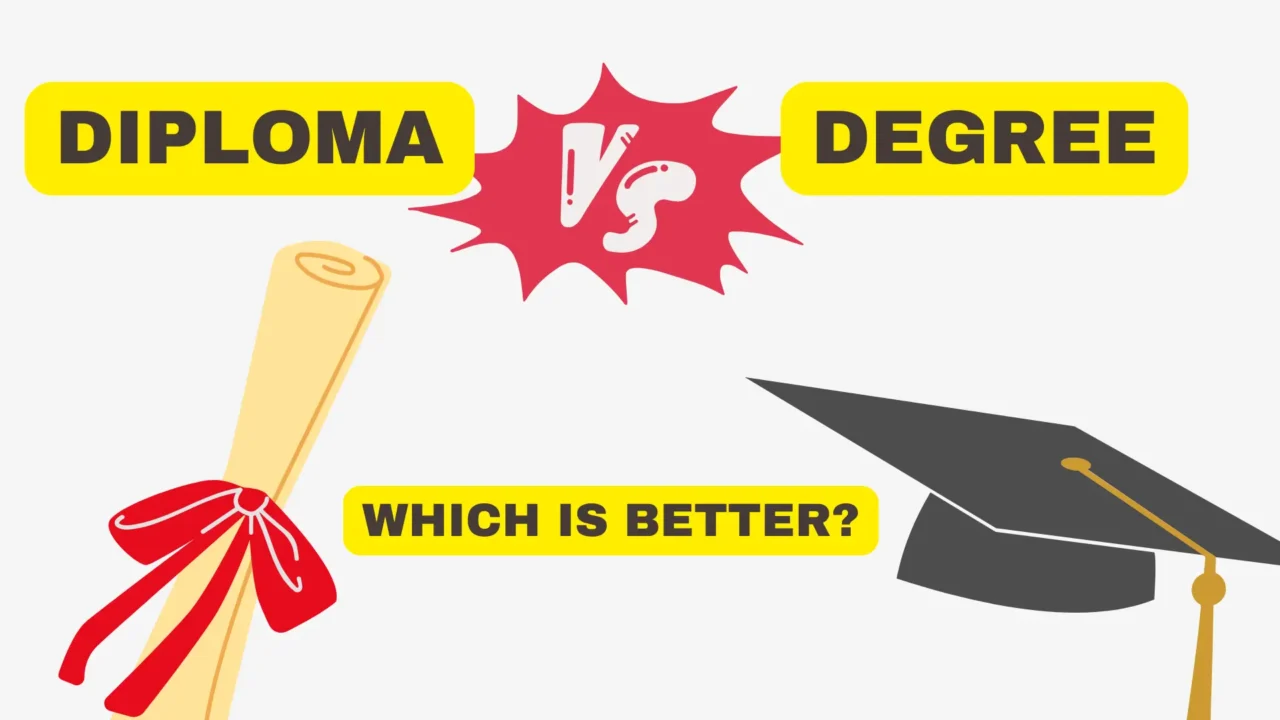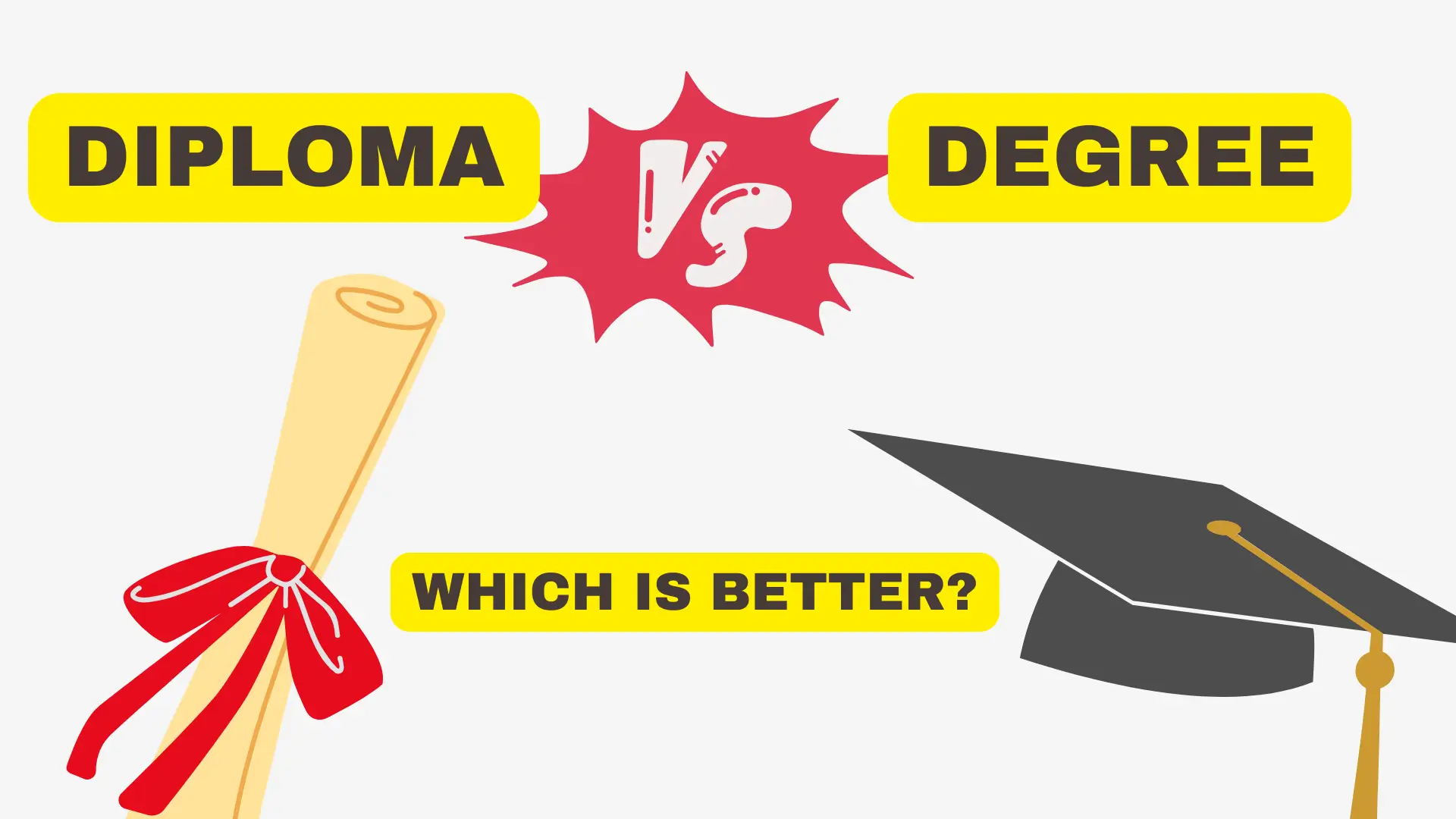Choosing between a diploma and a degree after completing 10th or 12th grade is a crucial decision that can shape your career path. Both options have their unique benefits and drawbacks, and understanding the differences can help you make an informed choice. While diplomas focus on practical skills and quicker entry into the workforce, degrees provide a broader and more comprehensive education, often leading to higher-level career opportunities. This article explores the key differences, advantages, and disadvantages of both pathways to help students decide which is better suited for their goals.
The decision largely depends on factors like career aspirations, time commitment, budget, and the type of industry you wish to enter. For instance, if you are looking for a quick start in a specific trade or profession, a diploma might be the right choice. On the other hand, if you aim for advanced positions or professions requiring in-depth knowledge, such as medicine or engineering, a degree would be more appropriate. Let’s dive deeper into the comparison.
Contents
Key Differences Between Diploma and Degree

| Aspect | Diploma | Degree |
|---|---|---|
| Duration | 6 months to 2 years | 3 to 5 years |
| Cost | Generally more affordable | More expensive |
| Focus | Practical skills for specific industries | Comprehensive theoretical and practical knowledge |
| Eligibility | Can be pursued after 10th or 12th | Typically requires completion of 12th |
| Career Opportunities | Entry-level roles in specific fields | Wider range of opportunities, including high-level positions |
| Academic Depth | Focused on job-specific training | Broader education with research and critical thinking components |
| Flexibility | Often flexible with part-time or online options | Requires full-time commitment in most cases |
Advantages of a Diploma
- Shorter Duration: Diplomas are designed to be completed quickly, often within 6 months to 2 years.
- Cost-Effective: They are generally less expensive than degree programs, making them accessible for students with budget constraints.
- Practical Skills: Diplomas emphasize hands-on training tailored to specific industries like healthcare, IT, or hospitality.
- Quick Workforce Entry: Graduates can start working sooner compared to degree holders.
- Flexibility: Many diploma courses offer part-time or online options, allowing students to balance work and studies.
Examples of Popular Diploma Courses:
- Graphic Design
- Digital Marketing
- Nursing
- Hotel Management
- Automotive Engineering
Advantages of a Degree
- Comprehensive Education: Degrees cover a wide range of subjects, providing an in-depth understanding of the chosen field.
- Higher Earning Potential: Degree holders often earn more over their lifetime compared to diploma holders.
- Wider Career Options: Degrees open doors to advanced roles in industries like engineering, medicine, law, and academia.
- Networking Opportunities: Universities offer exposure to peers, professors, and alumni networks that can aid career growth.
- Foundation for Further Studies: Degrees are essential for pursuing postgraduate education like master’s or doctoral programs.
Examples of Popular Degree Programs:
- Bachelor of Science (B.Sc.)
- Bachelor of Technology (B.Tech.)
- Bachelor of Arts (B.A.)
- Bachelor of Commerce (B.Com.)
- Bachelor of Medicine (MBBS)
Disadvantages of Each Option
Diploma:
- Limited Career Growth: Certain high-level positions may require a degree.
- Perceived Lower Prestige: Some employers value degrees more than diplomas.
- Narrow Focus: Diplomas often lack the broader academic foundation provided by degrees.
Degree:
- Time-Consuming: Degrees typically take 3 to 5 years to complete.
- Higher Cost: The tuition fees for degree programs can be significantly higher than those for diplomas.
- Lack of Immediate Practical Skills: Degrees may focus more on theory than hands-on training.
Factors to Consider When Choosing Between Diploma and Degree
Career Goals:
- If you aspire to work in technical fields like IT or trades such as plumbing or welding, a diploma may suffice.
- For professions like engineering, medicine, or law, a degree is mandatory.
Time Commitment:
- A diploma is ideal if you want to join the workforce quickly.
- A degree requires patience and dedication due to its longer duration.
Financial Constraints:
- Diplomas are more affordable upfront but may lead to lower earning potential in the long term.
- Degrees require higher investment but offer better financial returns over time.
Industry Requirements:
- Some industries prioritize practical skills (diploma), while others demand academic qualifications (degree).
Future Plans:
- If you plan to pursue higher studies later, a degree is necessary as diplomas may not always be recognized for postgraduate programs.
Which is Better After 10th?
- A diploma is suitable for students who want to specialize early in vocational fields like mechanics, fashion designing, or healthcare.
- A degree is not an option immediately after the 10th; students need to complete their 12th first.
Recommended Pathways After 10th:
- Pursue a diploma for early specialization.
- Complete your 12th grade if you wish to explore degree options later.
Which is Better After 12th?
- Choose a diploma if you prefer job-specific training and want quick employment.
- Opt for a degree if you aim for long-term career growth in fields requiring advanced qualifications.
Examples:
- For creative fields like animation or photography – Diploma
- For professional careers like engineering or medicine – Degree
Conclusion
Choosing between a diploma and a degree depends on your personal aspirations, financial situation, and career goals. A diploma offers quick entry into the workforce with practical skills tailored to specific industries but may limit long-term growth opportunities. Conversely, a degree provides comprehensive education with broader career prospects but requires more time and financial investment.
Ultimately, there is no one-size-fits-all answer; both pathways have their merits and limitations. Evaluate your interests, strengths, and long-term objectives before making your decision. Whether you choose a diploma or degree, ensure it aligns with your aspirations and sets you on the path toward success!
